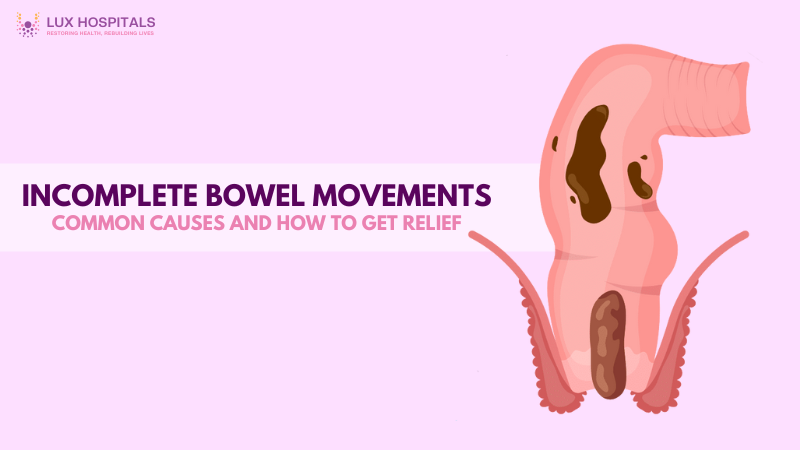Incomplete Bowel Movements: Causes and Easy Relief Tips

It can be painful and frustrating to have incomplete bowel movements. Even after using the restroom, you could feel as though your bowels haven’t been fully emptied. Diet, stress, and underlying medical issues are some of the causes of this prevalent digestive problem. Thankfully, there are helpful strategies for managing and getting relief. In this blog, we’ll go over the reasons, signs, and practical remedies to help you feel better and restore regular bowel movements.
What are Incomplete Bowel Movements?
Incomplete bowel movements refer to the sensation of not fully emptying the bowels even after defecation. Abdominal pain, bloating, or frequent impulses to use the restroom may accompany this. It’s crucial to realize that this feeling isn’t always related to the amount of feces; occasionally, it results from nerve or muscle problems that impact the colon and rectum.
Common Causes of Incomplete Bowel Movements
1. Constipation
- The most frequent reason behind incomplete bowel movements is constipation.
- Hard, dry stool can be challenging to pass, making evacuation painful.
- Contributing factors include low fibre intake, dehydration, and a sedentary lifestyle.
2. Irritable Bowel Syndrome (IBS)
- IBS, especially IBS-C (constipation-dominant), often causes this issue.
- The condition affects how the muscles in the gut contract and relax.
- Abdominal pain, bloating, and irregular bowel movements are common symptoms.
3. Pelvic Floor Dysfunction
- Weak or uncoordinated pelvic muscles can interfere with proper bowel emptying.
- This includes conditions like dyssynergic defecation, where muscles don’t relax as they should.
- It’s more common in older adults or after childbirth.
4. Rectal Prolapse or Obstruction
- Structural issues in the rectum can prevent complete evacuation.
- Rectal prolapse, rectocele, or a rectal mass can block stool passage.
- These issues may require imaging or a colonoscopy for diagnosis.
5. Poor Bathroom Habits
- Rushing or straining during bowel movements can worsen the problem.
- Ignoring the urge to go can lead to stool buildup and difficulty passing it later.
- Adopting a routine and proper posture can improve results.
Symptoms that may Accompany Incomplete Bowel Movements
- Feeling of fullness after using the bathroom
- Frequent return trips to the toilet
- Lower abdominal discomfort or cramping
- Bloating and gas
- Hard or lumpy stools
Depending on the underlying cause, these symptoms could change. condition affecting your bowel movements.
How to Get Relief from Incomplete Bowel Movements
1. Increase Fibre Intake
- Soluble and insoluble fiber both help regulate bowel movements.
- Good sources include oats, legumes, fruits, vegetables, and whole grains.
- Try to consume 25–30 grams of fiber per day.
2. Stay Hydrated
- Water softens stool, which facilitates passage. completely.
- Try to drink eight to ten glasses of water per day.
- Herbal teas and water-rich fruits like watermelon also help.
3. Exercise Regularly
- Your intestinal muscles are stimulated by physical activity.
- Activities like walking, yoga, and core exercises improve gut motility.
- Aim for at least 30 minutes of movement per day.
4. Use the Proper Toilet Position
- Squatting or using a footstool under your feet helps straighten the rectum.
- This posture makes bowel movements smoother and more complete.
- Try the “squatty potty” technique for better results.
5. Try Natural Laxatives and Probiotics
- Prunes, psyllium husk, and flaxseed are gentle laxatives.
- Probiotics like yogurt or kefir support healthy gut bacteria.
- These promote regular and complete bowel movements.
6. Seek Medical Help When Needed
- If symptoms persist despite lifestyle changes, consult a proctologists.
- Tests may be needed to rule out conditions like IBS, rectal obstruction, or motility disorders.
- Prescription medications or pelvic floor therapy may be recommended.
When to See a Doctor?
Persistent incomplete bowel movements, rectal bleeding, unintentional weight loss, or severe pain require medical attention. These may indicate a more serious underlying problem, such as colorectal cancer or an inflammatory bowel disease. Timely diagnosis ensures appropriate treatment and avoids complications.
Prevention Tips
- Stick to a regular bathroom schedule
- Don’t delay the urge to have bowel movements
- Avoid overuse of laxatives
- Manage stress through mindfulness or therapy
- Monitor your diet and identify trigger foods
Preventing incomplete bowel movements involves a consistent lifestyle that supports digestive health over time.
Conclusion
Incomplete bowel movements can negatively impact your comfort, digestion, and daily existence. This prevalent problem can be alleviated with dietary adjustments, adequate hydration, exercise, and better toilet posture. Never be scared to seek additional testing from a medical professional if these methods fail to address the issue at Lux Hospitals. The first step to restoring full and easy bowel motions for improved digestive health is to comprehend your symptoms and their causes.
Frequently Asked Questions
Constipation, IBS, pelvic floor dysfunction, or rectal structural issues often cause incomplete bowel movements. Dehydration, a poor diet, and inactivity might also be elements. Identifying the root cause is essential to getting the proper treatment.
Fixing incomplete bowel movements involves lifestyle changes like increasing fibre and water intake, regular exercise, and better toilet posture. In persistent cases, medical treatment or pelvic floor therapy may be required. Addressing any underlying health issues is also key.
Occasional incomplete bowel movements are usually not serious, but frequent occurrences may signal a chronic condition. It could be a symptom of IBS, rectal prolapse, or other digestive disorders. A doctor should evaluate persistent symptoms.
High-fiber foods like oats, beans, leafy greens, apples, and flaxseeds support healthy bowel movements. Probiotic-rich foods like yogurt also promote gut health. Staying hydrated while eating fiber-rich foods is essential for proper stool formation and passage.
Yes, anxiety can interfere with bowel movements by disrupting gut motility and increasing muscle tension. Stress-related conditions like IBS can also cause a feeling of incomplete evacuation. Stress management techniques can improve symptoms significantly.




















